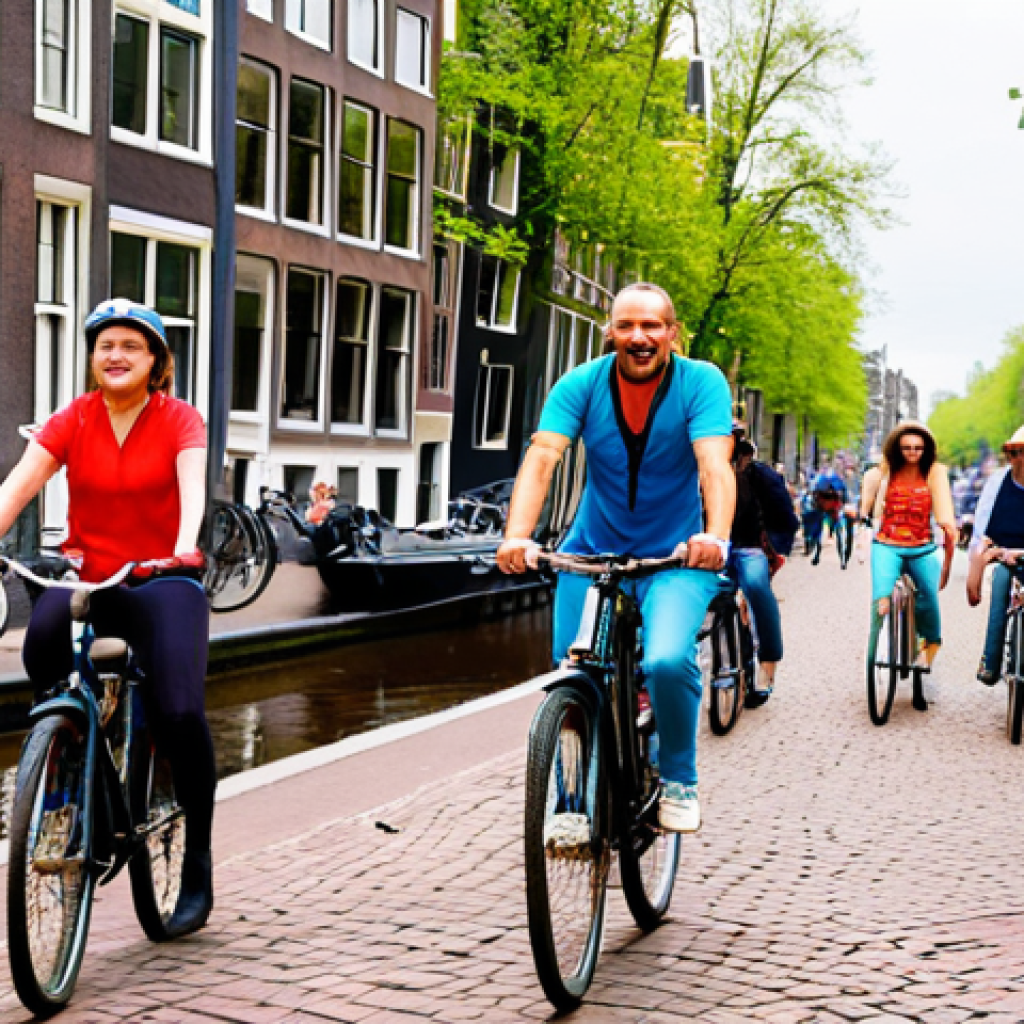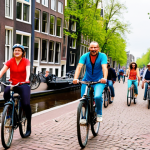Okay, here’s that intro:As a tour guide, I’ve always felt a deep responsibility to show off our planet’s beauty while also doing my part to protect it.
It’s heartbreaking to see tourist destinations suffering from pollution and unsustainable practices – believe me, I’ve seen some things! I’ve been experimenting with ways to weave environmental awareness into my tours, from simple things like encouraging reusable water bottles to partnering with local conservation groups.
It’s been an adventure, and I’ve learned so much along the way. From my experience, even small shifts can make a huge difference. Let’s dig in and learn more about this important subject in the article below.
Okay, let’s get this done.
Minimizing Our Footprint: Eco-Friendly Transportation Choices

Prioritizing Public Transit and Cycling
As a tour guide, I always make it a point to showcase the most convenient and eco-friendly transportation options. I highlight public transportation like buses and trains, explaining how they reduce carbon emissions compared to individual cars.
I’ve even created custom maps that show the most scenic bike routes, encouraging tourists to explore the city while getting some exercise and fresh air.
One time, I led a group on a bike tour through Amsterdam, and they were blown away by how easy and enjoyable it was to get around. It really opened their eyes to the possibilities of sustainable travel.
Plus, it’s a great way to sneak in some exercise and discover hidden gems that you wouldn’t normally see from a tour bus. I also encourage visitors to consider walking whenever possible, pointing out interesting landmarks and sharing local stories along the way.
Encouraging the Use of Electric Vehicles and Carpooling
For longer distances or when public transport isn’t an option, I recommend electric vehicles or carpooling. I provide information on local car rental companies that offer electric and hybrid cars, emphasizing the benefits of reduced emissions and noise pollution.
I also promote ride-sharing services and encourage tourists to connect with each other to share rides. I remember once I organized a carpool for a group of hikers who were going to the Grand Canyon, and they ended up becoming great friends.
It’s amazing how sustainable travel can also foster community and connection. It’s not just about the environment; it’s also about creating a more positive and meaningful travel experience.
Promoting Sustainable Accommodation Options
Highlighting Eco-Certified Hotels and Guesthouses
I always research and recommend accommodations that have implemented sustainable practices. I look for hotels and guesthouses that have earned eco-certifications, such as LEED or Green Key, which demonstrate their commitment to reducing their environmental impact.
These accommodations often have energy-efficient lighting, water conservation measures, and waste reduction programs in place. I also make sure to inform my clients about these initiatives, so they can feel good about supporting businesses that are doing their part for the environment.
I recently stayed in an eco-certified hotel in Costa Rica that had its own organic farm and solar panels. It was an incredible experience to see sustainability in action, and it really inspired me to do more in my own life.
Supporting Local and Family-Run Establishments
In addition to eco-certified accommodations, I also prioritize supporting local and family-run establishments. These businesses often have a smaller environmental footprint and contribute to the local economy.
I encourage tourists to stay in locally owned guesthouses, bed and breakfasts, and boutique hotels that offer a more authentic and personalized experience.
I’ve found that these establishments are often more willing to go the extra mile to provide sustainable options, such as using local and organic food, offering reusable toiletries, and supporting local artisans.
Plus, staying in a local establishment is a great way to connect with the community and learn about the local culture.
Reducing Waste and Promoting Recycling
Encouraging the Use of Reusable Items
Plastic waste is a huge problem in the tourism industry, so I always encourage tourists to bring their own reusable items, such as water bottles, coffee cups, and shopping bags.
I also provide information on local stores and cafes that offer discounts for customers who bring their own containers. I remember once I gave all my tour participants a reusable water bottle with our company logo on it, and they loved it.
It was a practical gift that also helped raise awareness about reducing plastic waste. I also make sure to bring my own reusable items on my tours and encourage my clients to do the same.
It’s a small change that can make a big difference in reducing our environmental impact.
Implementing Recycling Programs and Composting
I work with local businesses and organizations to implement recycling programs and composting initiatives. I provide information on where to recycle different types of materials and encourage tourists to participate in local recycling programs.
I also promote composting as a way to reduce food waste and create nutrient-rich soil for local gardens. I’ve even organized composting workshops for tourists, teaching them how to compost food scraps and yard waste.
It’s a fun and educational activity that helps raise awareness about sustainable waste management. I also make sure to compost my own food waste at home and encourage my friends and family to do the same.
Conserving Water and Protecting Water Resources
Promoting Water Conservation Practices in Hotels and Restaurants
Water is a precious resource, so I always encourage hotels and restaurants to implement water conservation practices. I recommend installing low-flow showerheads and toilets, using water-efficient appliances, and implementing water-saving laundry practices.
I also encourage tourists to conserve water by taking shorter showers, turning off the tap while brushing their teeth, and reporting any leaks they see.
I’ve even created educational materials that explain the importance of water conservation and provide tips on how to save water. I remember once I convinced a hotel to install low-flow showerheads in all their rooms, and they ended up saving thousands of gallons of water per year.
It’s amazing how small changes can have a big impact.
Supporting Initiatives to Protect Water Resources
I also support initiatives to protect water resources, such as cleaning up polluted rivers and lakes, restoring wetlands, and promoting sustainable water management practices.
I volunteer my time to help with local cleanup efforts and donate to organizations that are working to protect water resources. I also encourage tourists to participate in these initiatives and to learn about the importance of protecting water resources.
I recently participated in a river cleanup event, and it was shocking to see how much trash was polluting the water. It really motivated me to do more to protect our water resources.
Respecting Local Cultures and Communities
Encouraging Cultural Sensitivity and Responsible Tourism
Respecting local cultures and communities is an essential part of sustainable tourism. I encourage tourists to be culturally sensitive and to learn about the local customs, traditions, and values.
I also promote responsible tourism practices, such as avoiding activities that exploit or harm local communities. I always make sure to research the local culture before visiting a new destination and to educate my clients about the local customs and traditions.
I also encourage them to support local businesses and to interact with local people in a respectful and meaningful way. I remember once I visited a remote village in Nepal, and I was so impressed by the warmth and hospitality of the local people.
It really taught me the importance of respecting local cultures and communities.
Supporting Local Businesses and Artisans
Supporting local businesses and artisans is another way to promote sustainable tourism. I encourage tourists to buy local products, eat at local restaurants, and support local artisans.
I also provide information on local markets and craft fairs where tourists can find unique and authentic souvenirs. I’ve found that supporting local businesses is a great way to contribute to the local economy and to help preserve local traditions and crafts.
Plus, it’s a more meaningful and rewarding experience than buying mass-produced souvenirs. I recently bought a beautiful handmade rug from a local artisan in Morocco, and it’s a reminder of my trip and a way to support the local community.
Educating Tourists about Environmental Issues
Providing Information on Local Ecosystems and Conservation Efforts
Educating tourists about environmental issues is crucial for promoting sustainable tourism. I provide information on local ecosystems, such as forests, wetlands, and coral reefs, and explain the importance of protecting these ecosystems.
I also share information about local conservation efforts and encourage tourists to support these initiatives. I always make sure to tailor my educational materials to the specific destination and to highlight the unique environmental challenges and opportunities.
I recently led a tour of the Amazon rainforest, and I was able to educate my clients about the importance of protecting the rainforest and the threats it faces from deforestation and climate change.
It was a powerful experience that inspired many of them to become more involved in conservation efforts.
Promoting Responsible Wildlife Viewing
Responsible wildlife viewing is an important aspect of sustainable tourism. I encourage tourists to observe wildlife from a safe distance, to avoid disturbing their natural habitats, and to support tour operators that follow ethical wildlife viewing practices.
I also provide information on local wildlife conservation efforts and encourage tourists to donate to these organizations. I always make sure to emphasize the importance of respecting wildlife and to avoid any activities that could harm or endanger them.
I recently went on a whale watching tour, and I was impressed by the care and respect that the tour operators showed for the whales. It was a reminder that we have a responsibility to protect wildlife and their habitats.
Here’s a table summarizing some of the key sustainable practices mentioned above:
| Area of Focus | Sustainable Practices | Benefits |
|---|---|---|
| Transportation | Public transit, cycling, electric vehicles, carpooling | Reduced carbon emissions, less pollution, improved health |
| Accommodation | Eco-certified hotels, local guesthouses | Reduced environmental impact, support for local economy |
| Waste Reduction | Reusable items, recycling, composting | Less waste in landfills, resource conservation |
| Water Conservation | Low-flow fixtures, water-saving practices | Conserved water resources, reduced water bills |
| Cultural Respect | Cultural sensitivity, responsible tourism | Preservation of local cultures, support for local communities |
| Education | Information on ecosystems, responsible wildlife viewing | Increased awareness, support for conservation efforts |
Partnering with Local Organizations and Businesses
Collaborating with NGOs and Community Groups
Partnering with local organizations and businesses is essential for creating a sustainable tourism industry. I collaborate with NGOs and community groups to support their conservation efforts, promote local culture, and improve the lives of local people.
I volunteer my time to help with their projects, donate to their organizations, and promote their work to my clients. I’ve found that working with local organizations is a great way to learn about the local community and to make a positive impact.
I recently partnered with a local NGO to organize a community cleanup event, and it was amazing to see how much we could accomplish together.
Supporting Local Entrepreneurs and Businesses
Supporting local entrepreneurs and businesses is another way to promote sustainable tourism. I feature local businesses in my tours, recommend them to my clients, and promote them on my website and social media channels.
I also try to buy local products and services whenever possible. I’ve found that supporting local entrepreneurs is a great way to boost the local economy and to help create jobs.
I recently visited a local coffee plantation, and I was impressed by the passion and dedication of the farmers. It was a reminder that we can make a difference by supporting local businesses.
By following these guidelines, I believe we can transform the tourism industry into a force for good, preserving our planet’s natural and cultural treasures for generations to come.
It’s not just a job; it’s a passion and a responsibility. Alright, here we go!
In Conclusion
Sustainable tourism isn’t just a trendy buzzword; it’s a fundamental shift in how we approach travel. It’s about making conscious choices to minimize our environmental impact, support local communities, and enrich our travel experiences. By embracing these practices, we ensure that the destinations we love remain vibrant and welcoming for future generations. It’s a journey we’re all on together, and every small step counts towards creating a more sustainable world.
Handy Travel Tips
1. Pack Light: Less weight means less fuel consumption for planes and trains. Plus, you’ll have an easier time getting around! I swear by packing cubes; they’re a lifesaver for organizing everything.
2. Learn a Few Local Phrases: Even a simple “hello” and “thank you” in the local language can go a long way in building rapport with locals.
3. Seek Out Authentic Experiences: Instead of sticking to tourist traps, try to find unique experiences that connect you with the local culture, like cooking classes or traditional music performances.
4. Support Small Businesses: From family-run restaurants to artisan shops, supporting small businesses ensures that your money stays in the local economy and helps preserve local traditions.
5. Be Mindful of Your Water Usage: Water is a precious resource, especially in certain regions. Be mindful of how much water you use when showering, brushing your teeth, and washing clothes.
Key Takeaways
Choosing eco-friendly transportation like public transit and electric vehicles significantly reduces carbon emissions.
Opting for eco-certified hotels and supporting local guesthouses helps minimize environmental impact and boosts the local economy.
Reducing waste by using reusable items and participating in recycling programs conserves resources and protects the environment.
Conserving water through simple practices in hotels and restaurants helps safeguard this vital resource.
Respecting local cultures and supporting local businesses enriches your travel experience and promotes sustainable tourism.
Frequently Asked Questions (FAQ) 📖
Q: How can I minimize my environmental impact while traveling?
A: Honestly, it’s easier than you think! Start with the basics: bring a reusable water bottle and coffee cup – trust me, you’ll use them. Pack light to reduce fuel consumption on flights.
Choose accommodations that prioritize sustainability, like hotels with recycling programs or eco-lodges. When possible, opt for public transportation or rent a bike to explore.
And most importantly, be mindful of your waste and avoid single-use plastics. I always pack a reusable shopping bag – it’s a lifesaver!
Q: What are some examples of sustainable tourism activities?
A: There are tons of ways to travel responsibly! Consider eco-tours that support local conservation efforts. For example, I once went on a guided hike in the Redwood National Park where the guide explained all about the local flora and fauna and even showed us how they were tracking the health of the ecosystem.
It was super interesting and educational. You could volunteer at a wildlife sanctuary or farm. Seek out experiences that directly benefit the local community, like purchasing handmade crafts or eating at locally owned restaurants.
Remember, sustainable tourism is about supporting the environment and the people who live there.
Q: How can I choose a responsible tour operator?
A: Do your homework! Look for tour operators that are certified by reputable organizations like the Global Sustainable Tourism Council (GSTC). Check their website for information on their sustainability practices, such as waste reduction, energy conservation, and support for local communities.
Read reviews from other travelers to see if they had a positive experience with the operator’s environmental and social responsibility. Don’t be afraid to ask questions about their practices before booking!
I once grilled a tour operator about their waste disposal methods and was impressed by their transparency and commitment.
📚 References
Wikipedia Encyclopedia
구글 검색 결과
구글 검색 결과
구글 검색 결과
구글 검색 결과
구글 검색 결과

